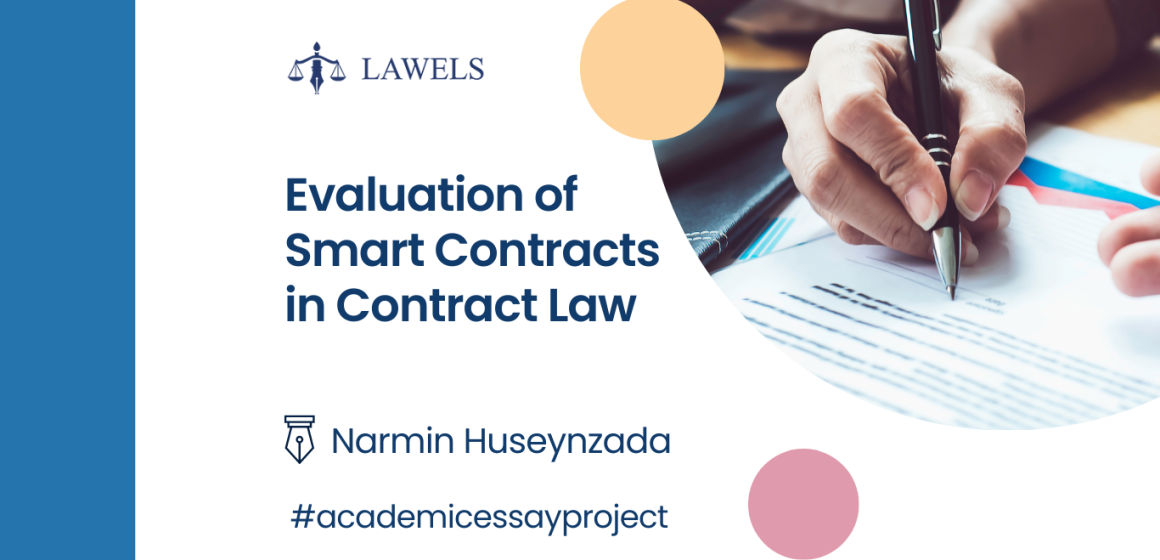Author: Narmin Huseynzada, LLB, Baku State University, 2016-2020
Editor: Bader Kabbani, LLM International Commercial and Economic Law, SOAS, University of London, 2020-2021
Laws play a significant influence on both smart and regular contracts. However, when analyzing how smart contracts work, they differ from the term “contract” that is used in the legal meaning. Nick Szabo, a computer scientist, first used the word “smart contract” to define them as “a computerized transaction protocol that executes the terms of a contract” (1). In fact, one of the key features of smart contracts is that they do not use legal terms and operate with no centralized authority or legal system. It has unique features that differ from classic contracts. This article will analyze how smart contracts are subdued within contract law and evaluate the distinguished features of smart contracts under the existing legal system.
Are smart contracts legally binding?
Both in civil and common law jurisdictions, if one party accepts the other party’s offer, the contract is deemed binding. Smart contracts are designed to express contractual terms in a programming language rather than in a natural language. They have their own “working style” to traditional contracts. Smart contracts are based on if/then conditional statements. Once ‘if’ is satisfied, then the contract is automatically executed. But the question is how to define the moment of offer and acceptance. Or is it really important to define such a moment? In reference to article 18 of the CISG, “a statement made by or other conduct of the offeree showing assent to an offer is an acceptance”. As to English law, “a contract is a legally binding promise (written or oral) by one party to fulfil an obligation to another party in return for consideration” (2). Under English law, a contract should possess consideration and intent of parties to create legal relations. A valid contract under German law does not require the offer and acceptance to be declared expressly (3).
This analysis shows that, for creating a legally binding contract, the intention to be bound by obligation is a key criterion rather than its form. It means, in some jurisdictions, the code itself can be enough to establish legal obligations.
Legal challenges
In traditional contracts, each party of the contract has to fulfil its obligations. In smart contracts, once the condition is performed, the contract itself performs the obligation. It reduces the risk of breach by the counterparty and other time-consuming and costly procedures for seeking a remedy. But not all contracts are formed in good faith. The notions of invalidity or illegality are unknown to code. Smart contracts are immutable, which means no change is permissible on the confirmed transaction (4). The immutability of smart contracts makes it difficult to overcome issues if the law does not support such kind of performance. The automatic performance and bugs in code create the problem of undoing what was done. In the DAO, a hacker stole millions of ether after finding a loophole in coding (5). Because smart contracts have a decentralized nature, it is questionable how and who will be responsible for such losses.
The other key feature of smart contracts is their certainty. The programmer can code so that there will be no need for further human intervention for the contract execution. However, sometimes there can be circumstances that are not directly related to the intention of the parties—for instance, traditional contractual terms like force majeure or hardship. At the same time, if a contract becomes illegal after its formation, then the parties can be excused from performance and there is no remedy for an aggrieved party. This is a problem in smart contracts. There is also a problem when a change in law happens. Some authors suggest that the relevant jurisdictions can create a system where a smart contract would update the terms of the contract if there is a change in the application programming interface (API) containing legal provisions. (6).
Conclusion
All in all, although smart contracts can be legally binding in some jurisdictions, their performance and regulation phases face challenges. At first look, immutability, certainty, self-enforceability, decentralization and cost-saving features of smart contracts seem like advantages. However, practical issues, especially no centralization by a governmental authority, raise questions about how persons would seek remedy should something go wrong. On the other hand, bringing the intermediary minimizes the attractiveness of smart contracts that are automatically executed in the agreement with no third-party confirmation. So, maybe the expression of smart contracts can get the status within contract law. As per regulating performance, the existing legal rules will need to be adapted to conform to the new features of smart contracts.
References
- Nick Szabo, Formalizing and Securing Relationships on Public Networks, Volume 2, Number 9 FIRST MONDAY (Sept. 1, 1997)
- Thomson Reuters Practical Law, https://uk.practicallaw.thomsonreuters.com/3-107-4828?transitionType=Default&contextData=(sc.Default)&firstPage=true
- Benjamin Baisch, Björn Weidehaas and Marius Mann, Contract Formation in Germany
- Erfan Andesta; Fathiyeh Faghih; Mahdi Fooladgar, Testing Smart Contracts Gets Smarter, https://ieeexplore.ieee.org/document/9303670
- Robbie Morrison, Natasha C. H. L. Mazey, and Stephen C. Wingreen, The DAO Controversy: The Case for a New Species of Corporate Governance? https://www.frontiersin.org/articles/10.3389/fbloc.2020.00025/full
- Jelena Madir, Smart Contracts: (How) Do They Fit Under Existing Legal Frameworks? p.11, https://papers.ssrn.com/sol3/Papers.cfm?abstract_id=3301463
Bibliography
- Nick Szabo, Formalizing and Securing Relationships on Public Networks, Volume 2, Number 9 FIRST MONDAY (Sept. 1, 1997)
- Thomson Reuters Practical Law, https://uk.practicallaw.thomsonreuters.com/3-107-4828?transitionType=Default&contextData=(sc.Default)&firstPage=true
- Benjamin Baisch, Björn Weidehaas and Marius Mann, Contract Formation in Germany
- Erfan Andesta; Fathiyeh Faghih; Mahdi Fooladgar, Testing Smart Contracts Gets Smarter, https://ieeexplore.ieee.org/document/9303670
- Robbie Morrison, Natasha C. H. L. Mazey, and Stephen C. Wingreen, The DAO Controversy: The Case for a New Species of Corporate Governance? https://www.frontiersin.org/articles/10.3389/fbloc.2020.00025/full
- Jelena Madir, Smart Contracts: (How) Do They Fit Under Existing Legal Frameworks? p.11, https://papers.ssrn.com/sol3/Papers.cfm?abstract_id=3301463
- Marco Dell’Erba, Do Smart Contracts Require A New Legal Framework? Regulatory Fragmentation, Self-Regulation, Public Regulation (Aug. 20, 2018), https://papers.ssrn.com/sol3/Papers.cfm?abstract_id=3228445.
This article is written within the Academic Essay Project (AEP) organised by LAWELS. AEP aims to increase the number of quality academic writings on legal topics, encourage young lawyers to participate in academic writing, and lay the foundation of an online database on legal science. The team of legal editors and legal writers share their knowledge through high-end essays that we are publishing on our website and social media accounts for the world to read and learn from.
The articles on the LAWELS platform are not, nor are they intended to be legal advice. You should consult a lawyer for individual advice or assessment regarding your own situation. The article only reflects the views of the author.


